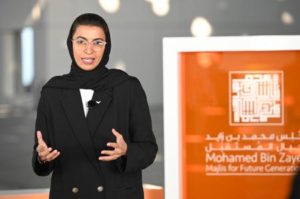Mohamed Bin Zayed Majlis For Future Generations Concludes With Final Chapter Looking Forward To ‘The Next 50 Years’ For The UAE
Outlining a clear vision for the future, embracing innovation, and relying on competence and intelligence to address challenges were all cited as key tactics the UAE will be employing to achieve its long-term goals as the Mohamed Bin Zayed Majlis for Future Generations 2021 wrapped up with its third and final chapter: The Next 50 Years.
Speakers noted that these objectives will ultimately map out a bright future for the UAE – one where the youth will play an essential role in sustaining the country’s momentum and track record of accomplishments, allowing it to fulfil its vision to lead the world in various sectors.
Organised by the Education Affairs Office at the Abu Dhabi Crown Prince Court, this virtual third edition of the Majlis took place on March 14, 2021, under the theme Thriving in the Next Normal. Discussions in the third and final chapter – The Next 50 Years – focused on a set of key enablers that will allow the UAE to shape its future, most notable among them being cooperation between the government and private sector to face challenges, venturing into emerging sectors, and embracing digital worlds and innovation.
‘The Next 50’ Generation
Her Excellency Ohood Khalfan Al Roumi, Minister of State for Government Development and the Future, delivered a keynote address as part of the third chapter of the Mohamed Bin Zayed Majlis for Future Generations titled The Next 50 Years. “The UAE is committed to investing in human beings and empowering its citizens to take part in the national efforts to achieve the country’s aspirations to be a world leader in time for its Centennial,” H.E. asserted.
“The youth are the UAE’s end-goal and the engine driving our efforts to build a prosperous future. The government’s efforts to empower and upskill the youth echo the line of action championed by [our leadership] to empower the ‘Mission Generation’ – UAE youth who boast the skills, experience, and determination needed to shape a bright future,” H.E. Al Roumi said, outlining three objectives to prioritise moving forward, namely, the Economy of the Future, Advanced Skills and Lifelong Learning, and Promoting Mental Health.
“The Fourth Industrial Revolution will provide tremendous opportunities in promising economic sectors. Every aspect of life, work, and transportation will be affected by digital transformation, which is poised to create USD23-trillion opportunities in the next five years,” H.E. explained. “The jobs of the future will rely on digitisation and technology. Demand is rising for specialists in data science, the internet of things, artificial intelligence, cybersecurity, regenerative medicine, and genome medicine.”
“It is critical that we support the youth to develop the skills of the future, and expand their ability to learn, develop, and adapt in order to prepare them to deal with rapid developments and to benefit from emerging opportunities,” H.E. stressed, revealing that several studies had indicated that 149 million new jobs will be created by 2025, most of which will rely on the skills of the future.
H.E. Al Roumi then went on to address the third and final objective – mental health, which she described as “having a significant impact on people’s lives in light of the prevalence of technology, our increasingly fast-paced lifestyle, and the influence of social media.”
H.E. urged the youth to take better care of their mental health, which is an integral part of the holistic health concept, alongside physical and social health.
Doubling the Economy in the Next 10 Years
In a session titled Doubling the Economy in the Next 10 Years, experts discussed the UAE’s plans to double its GDP from AED1.5 trillion to AED3 trillion, boosting growth and ensuring a diversity of jobs, entrepreneurial opportunities, and business activity. By partnering with the private sector, the government can solve some of the most pressing challenges of our times, the speakers asserted, moving on to exploring how the youth can contribute to the UAE’s economic agenda.
Speaking at the session, H.E. Abdulla bin Touq Al Marri, Minister of Economy, asserted that attracting young minds and creative talents from around the world is a key objective for the UAE. To do so, he explained, “we must re-examine many aspects…chief among them being residency and citizenship laws in the UAE. Our wise leadership has called for setting clear policies for granting citizenship and golden visas for long-term residency for many innovators, entrepreneurs, talented individuals, inventors, and many others.”
H.E. Abdulla Al Marri asserted that the UAE is aiming to empower 100 new entrepreneurs every year and to transform startups into pioneering companies. “To that end, we need to support innovation and entrepreneurship by creating a stimulating environment where copyright and intellectual property is guaranteed, and where support is available to help entrepreneurs turn these ideas into concrete projects,” he added.
“Entrepreneurs are star players in a team that includes four other members, which are universities and colleges, large corporations, capital and funds, and the government, whose role is to identify potential challenges. The remaining players, meanwhile, work to develop solutions for them, relying on innovation and making use of available resources for success,” H.E. noted.
Frontier Industries
Speakers in the Frontiers Industries session explored the UAE’s ambitions to push the boundaries of science and technology.
H.E. Sarah Al Amiri, Minister of State for Advanced Technology, spoke of the UAE Mars mission as an example of these ambitions. “The mission has been a series of challenges, but it all started…with a leadership that dares to take audacious visions and transforms them into reality. That is one key for success for any nation that ventures into technology, space and into establishing its industry to be deeply rooted in technology,” she said.
“When I looked up, around that tiny [red] dot revolved a piece of equipment that I had set my hands on and worked on for so many years. That for me was transformative,” H.E. Al Amiri recalled, adding that when designing this mission, “we avoided copying and pasting any model that existed. For us to have growth we need to continuously reinvent ourselves, be agile, and continue to discover the frontier. When you’re paving a new road, when you’re putting down new tracks, you’re creating a new journey.”
“You have to take daring, audacious dreams and transform them from hopes into reality,” H.E. Al Amiri concluded, addressing young participants and the youth in general.
Keys to Thriving in the Next Normal
H.E. Shamma Al Mazrui, Minister of State for Youth Affairs, offered advice to young people to not only cope with the current circumstances, but also thrive in the Next Normal.
“You have to focus your time and energy into your personal vision for your life. Every day is a chance to get one step closer to realising the version of yourself you aspire to be – Where do you want to go? Who do you want to become? How do you want to be remembered?” H.E. said. “Positivity is a choice you have to make, every day, no matter what else is going on. Be the person who smiles and greets life with excitement and focuses not on the problems, but on the opportunities. It just may surprise you the difference that positive thinking can make.”
“Change is stressful, but neither stress nor change have to be scary. Our lives are a constant adaptation to a world that is always in motion. All change brings opportunity; some change gives us the opportunity to pause and ask what we can do better,” H.E. Al Mazrui continued.
“Learn continuously,” the Minister of State for youth affairs advised her young audience. “Practice lifelong learning, read beyond the headlines and immerse yourself in it daily. Education does not end when our schooling does. You will ultimately produce better work as a student or an employee if you give yourself the space to learn.”
Artificial Intelligence and Its Impact on the Economy
Speaking at the Frontier Industries session, Professor Dr Eric Xing, President of the Mohamed bin Zayed University for Artificial Intelligence (MBZUAI), addressed the issue of AI and its impact on the economy, explaining that while it could be misunderstood as a potential threat for human workers, what AI is doing is actually the opposite. “[It is] not competing with humans in the sectors they are good at, it is merely complementary [in sectors] humans are not very good at,” he said. “It is going to make the job experience even better.”
“To create a research university [specialising in] AI is indeed a very visionary and very bold move, which I am very happy to see happening in this country for the first time in human history,” Dr Xing added. “It is going to give the country a tremendous upper hand in the global competition of technology and the economy.”
Addressing the youth, the MBZUAI President stressed “it is still very important to be prepared thoroughly for the fundamentals. It is more important to learn the basic mathematics, liberal arts and learn the social skill of communicating and interacting with people. One of the risks in this new age of social media and in this new age of automation and AI is that many people start to lose the ability to communicate.”
“The best way is to strike a balance of embracing the new methodology and opportunity, but also keeping the tradition so that you become better empowered and also better balanced,” he recommended.
Developing Young People’s Scientific and Creative Skills
Speaking at the same session (‘Frontier Industries’), H.E. Mohamed Al Hammadi, Chief Executive Officer of the Emirates Nuclear Energy Corporation, said: “Last year, our country joined the ranks of advanced nations with the capacity and know-how to produce electricity using nuclear energy – a historic achievement for the UAE.”
“We are proud to say that the Al Barakah Nuclear Power Plant will provide eco-friendly energy and support economic development for more than 60 years in the future. These stations provide nearly 25% of the UAE’s demand for electricity, 24 hours a day and free of carbon emissions,” H.E. Al Hammadi explained. “From day one of this project, our focus has been on attracting young people, developing their scientific skills in this important sector, creating a set of rewarding job opportunities, and empowering a new generation of leaders in the energy sector across the UAE. So far, more than 500 UAE students have benefitted from the opportunities we have provided.”
“Climate change and its impact on the environment has become a leading concern and topic of discussion for the international community,” H.E. noted. “We are proud of our country’s ground-breaking contributions in this regard, where the UAE has committed to developing eco-friendly projects that helped reduce annual carbon emissions by 21 million tons – which is equivalent to the CO2 emissions from all vehicles in the country combined.”
Digital Worlds and Creativity Superheroes
Creativity is now a global market, asserted the panel of experts taking part in the Digital Worlds and Creativity Superheroes session, noting that the unprecedented growth in digital technologies, combined with the new creative opportunities ushered in by immersive technologies, will translate into the creation of new global champions of creativity. The session then moved on to explore the most important opportunities the sector brings for the UAE’s cultural and creative industries.
“The UAE has a 10-year federal strategy that will look at ways in which the creative and cultural sector can be measured. With the growth of this sector, we are looking at creating more than 15,000 jobs,” said H.E. Noura Bint Mohammed Al Kaabi, Minister of Culture and Youth.
“This year, the UAE announced its talent visa, the golden visa and the talent citizenship in celebration of diversity. Because a cultural hero does not necessarily need to be an Emirati, but a resident of the UAE who embodies the ethos of the UAE as a nation, speaking to its universal values,” H.E. added.
“We are in living in uncertain times, yet the digital world has enabled us to continue to experience culture and creativity even during a global pandemic,” H.E. Al Kaabi noted. “Here in the UAE, we have the advanced technology, the networks and connectivity to do so. The arts – music, dance, theatre and poetry – predate modern technology, and right now we need to be looking at how our digital tools can complement this industry by ensuring not only its continuity, but also its growth.”
The Minister then went on to advise young people looking to build careers in these times to stay focused on acquiring multiple skillsets. “The future is multidisciplinary, so staying ahead of trends and being critical of what you choose to study is important,” she said. “Youth today need to be open to new ideas while exploring and challenging their own.”
Developing Communications Skills
Speaking at the same session, Amit Sood, Director at Google Arts and Culture, noted that over the past 12 months, his team found that people were eager to engage with museums, art, and cultural content. “We have seen tremendous traffic from around the world of people seeking respite through learning and interactive experiences,” he said. “Specifically, we are seeing an increased appetite for shared experiences using Augmented Reality, because new technologies like AR and gaming are emerging as big areas that art and culture will embrace.”
However, it is not all about the digital for Sood, who said that although outlooks tend to be future focused, a look to the past would help not only stimulate more creativity, but also enable the youth to build better careers and stronger skillsets.
“For young people setting out on their journey, it is important to experiment. You will never get it right the first time, but it is important to keep rolling with it,” he said. “And although digital skills are important, they will not get you very far if you do not also develop your communication and interpersonal skills, because how you interact with people is crucial.”
The Future of Social Networks
The global pandemic changed how people produce and consume content, asserted Hussein Freijeh, General Manager of Snap Inc. for MENA. “In 2020, we saw a major need for people to not only communicate with their friends and family, but also to find trusted news sources – and naturally people turned to social media.”
“Cameras today are playing a transformative role in our lives because what started out as a form of hardware, enabling people to capture important moments, has evolved into a connected software allowing visual communication and connection for shared experiences,” he said. “The camera will…eventually become a medium of consumption, for example through the scanning of products that you can purchase directly…the opportunities are endless.”
Freijeh offered advice to young people looking to build careers, saying: “Focus on your passions, the ones you know will have an impact, while remaining patient – because the world is changing around you, and you need to keep learning as it does.”
Technology and Its Impact on Culture
Eddy Maroun, Co-Founder and CEO of Anghami, said the global pandemic merely accelerated what was an inevitable evolution. “Before last year, we never would have thought that people would pay for a ticket to watch a concert online, but that happened,” he said. “We also watched people become radio hosts and DJs within our platform through the tools we offered that enabled creators, be they musicians, podcasters or hosts, to easily create their own shows within the platform – and even monetise them.”
Regarding new media, Maroun said that audio has emerged as a strong player, with huge potential. “The boom in podcasting and the recent success of apps such as Clubhouse are proving audio is becoming essential,” he said. “And the infrastructure and ecosystem of the UAE offers great room and opportunity for growth.”







